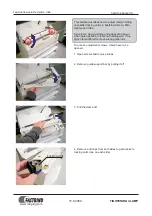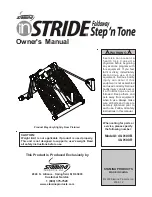
Threading Medium Weight Thread
Medium weight threads,
including topstitching thread, Decor rayon and stretch nylon thread, are
too bulky to form a knot that would fit through the threading port, but they can slip through the hole
with the aid of a thread "cradle" made from regular serger thread (page 51).
Using Specialty Threads
Threading Lightweight Thread
Changing Threads
Beautiful stitches can be formed by serging with specialty threads, cords and ribbons. These
heavier or shinier threads can be used to enhance appearance, add strength or elasticity, or
create special effects, depending on the thread you choose.
Some specialty threads work well through the needle and loopers. There are some that are too heavy
for the needle and should only be used in the loopers.
Use the Specialty Thread chart on pages 53/54 as a guide keeping in mind that the threads can vary
from one manufacturer to another. It is best to sew test for best results.
Note:
Thicker threads require longer stitch length.
Specialty thread used in the needle can be threaded in the usual way. The ease with which they
can be threaded in the loopers, however, depends on thread thickness.
1. Clip the existing thread at the cone and remove the cone
from the spindle. (fig. A)
2. Place the new cone on the spindle. With the two threads
together, tie an overhand knot or square knot. (fig. B)
3. Raise the presser foot, and pull the old thread from under
the foot until the new thread comes through the machine.
Note:
When changing a needle thread, pull the thread
through until it reaches the needle eye. Then clip off the
knot (fig. C) and rethread the needle eye manually or with
the needle threader.
L
R
B
C
A
U
S
I
N
G
S
P
E
C
I
A
L
T
Y
T
H
R
E
A
D
S
49
Содержание Acclaim BLES4
Страница 1: ......
Страница 5: ...C O N G R A T U L A T I O N S 2 Notes...
Страница 19: ...O V E R V I E W 16 Notes...
Страница 64: ...ES4 TA EI 45 TA Printed in Japan...













































